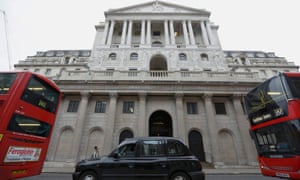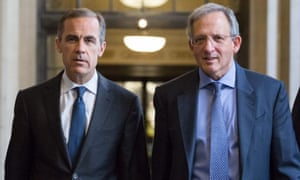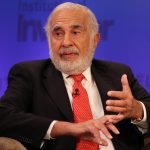Central bank will open lending facility on three extra days to prevent financial sector suffering a credit squeeze at time of vote

The Bank of England has heightened fears that Britain’s referendum on EU membership will destabilise already fragile financial markets, pledging to provide extra funds to banks and building societies before and after the 23 June vote.
As the Bank’s governor, Mark Carney, prepares to appear before MPs in parliament to discuss the potential implications of leaving the EU, the central bank said it would open its lending facility on three extra days as a precautionary measure to prevent Britain’s financial sector suffering a credit squeeze.
The extra funds will be available on two dates before the referendum and one after, in addition to the usual monthly operations run by Threadneedle Street to support short-term borrowing.
Carney, who has warned of the difficulties ahead for the economy, is due before the Treasury select committee on Tuesday morning. He will appear with Sir Jon Cunliffe, deputy governor in charge of financial stability.

All of Britain’s major banks have warned that the uncertainty surrounding the referendum is adding to the turmoil in global financial markets and unsettling businesses, which are largely in favour of the status quo.
Royal Bank of Scotland, which is 73% owned by taxpayers, spelt out the risks in its annual report a fortnight ago, pointing out that it could also have political ramifications.
“The referendum on the UK’s membership of the EU during this parliament increases economic and operational uncertainty. The result may also give rise to further political uncertainty regarding Scottish independence,” it said.
Barclays, which has argued its customers would be better off if the UK stayed in the EU, said last week: “In the UK, the referendum on EU membership gives rise to some political uncertainty and raises the possibility of a disruptive and uncertain exit from the EU, with attendant consequences for investment and confidence.
“Following the referendum in June 2016, in the event that there is a vote in favour of leaving the EU, a period of negotiation is likely, widely anticipated to be around two years, with unpredictable implications on market conditions.”
Matthew Elliott, the chief executive of Vote Leave said: “It’s almost as if pro-EU scaremongers think it would be better not to give the public a vote at all, keeping power in the hands of unelected EU officials and unaccountable EU judges.
“They predicted the world would end if we didn’t join the euro and now they are at it again with the referendum. The biggest risk to the British economy on 23 June is sticking with an unreformed EU which will enable Brussels to seize more money and more control.”
The Bank said the regular monthly indexed long-term repo (ILTR) operations, which provide liquidity for banks, building societies and broker-dealers, would be extended to run on the 14 June, 21 June and 28 June.
One of the bank’s roles is to act as a market maker of last resort, offering to buy assets that traders in the market have refused to buy or sell. It was widely criticised during the 2007 collapse of Northern Rock, accused of failing to offer sufficient support in the form of short term loans.
[Source:- The Gurdian]



